How the budget will impact Australians of all ages
From students and young families to professionals and retirees, Australians are grappling with cost-of-living pressures. How will the budget help – or hinder – them?
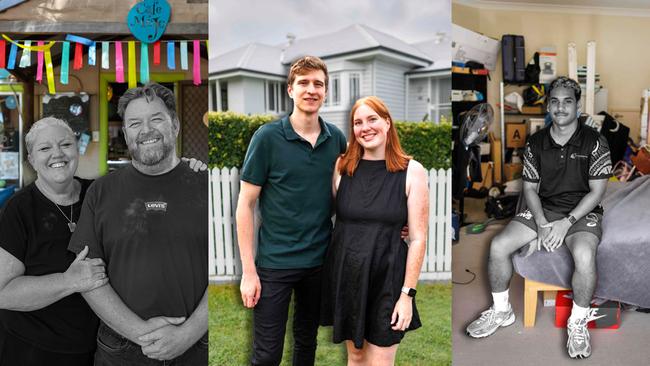
In the lead up to Tuesday’s federal budget, The Australian asked students, young families, retirees and professionals what they hope would be delivered under Labor's new economic plan. This is what they had to say.
See more of The Australian’s federal budget coverage here.
How the budget will impact Australians of all ages
Bundle of joy delivers bundle of costs stress
For Bonnie Rogers and Elliott Knight, life is about to get a whole lot more exciting – and expensive.
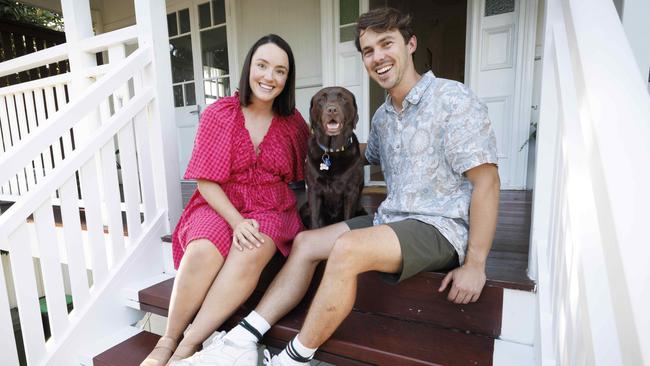
The 31-year-old intensive care nurse at Brisbane’s children’s hospital and her 35-year-old primary school teacher partner – and their five-year-old chocolate labrador, Millie – are expecting their first baby in early June.
And while the young family are thrilled at the impending arrival of the newest member, they’re more than a little nervous about the effect on their family budget. Ms Rogers and Mr Knight bought their first home – a character-filled Queenslander cottage in Moorooka, about 9km south of Brisbane’s CBD – about eight months ago, and their variable-rate mortgage is their biggest expense. Currently, mortgage repayments are manageable with their combined annual income of $230,000, but when Ms Rogers goes on maternity leave things will be tighter.
Unfortunately, she’ll miss by a matter of weeks the Albanese government’s move to make federal paid parental leave more generous; on July 1, the scheme will expand from 20 weeks at minimum wage to 22 weeks and, importantly, superannuation will be paid for the first time. By 2026, the scheme is due to expand to six months, or about $24,000 on current minimum wage rates.
As well as the federal government’s program, Ms Rogers’s own employer, Queensland Health, offers 14 weeks’ parental leave at full pay, or 28 weeks’ leave at half-pay.
Ms Rogers describes the combination of the paid parental leave schemes as “a lifesaver”.
“I couldn’t imagine going back to work after three months. It would be very difficult,” she said.
“But you always have that lingering stress of ‘can we afford it’? How much are we going to be able to afford to live, if either we’re getting paid at half-pay, or not being paid at all? What’s the compromise?”
“It’s definitely been a big discussion over the last couple of months.”
With less money coming in once their baby girl arrives, household expenses such as electricity and groceries will become more daunting.
Until recently, Ms Rogers and Mr Knight shared their home with another couple, and their quarterly power bill was $800, thankfully offset by state and federal rebates.
While Mr Knight accepts that further electricity rebates are helpful, they don’t address bigger, structural economic problems.
“Those rebates, one-off payments, don’t really address the issue which is increasing prices of housing and other things and wages that are not keeping up with that over a sustained period,” Mr Knight said.
The electorate of Moreton should be a relatively safe seat for Labor, but veteran local MP Graham Perrett (who holds the seat on a margin of 9.1 per cent) is retiring, and the Greens are on the march.
Mr Knight had always considered himself an ALP voter, but lately he has backed the Greens, believing the major parties aren’t doing enough for working people.
The primary school teacher says he’s concerned that without a concerted effort and structural policy changes from the major parties, society will become even less equitable, and it will be impossible for his and Ms Rogers’ daughter to buy a home in a few decades’ time.
“I’d love to see more investment in affordable and social housing. That would fill some of the demand and reduce pressure on property prices.”
“And also, I have a slight bias, but more investment in the public education system so we have a more equitable society.”
“Our little girl is going to come into a world where hopefully she can receive a good education, afford to buy a house, and have a chance to get ahead.”
“If we keep going in the direction we’re going where the cost of housing in particular keeps going up, and wages aren’t keeping up with it, I think that where we are in 20 years’ time could be a really inequitable place.”
Mr Knight said the newly announced tax cuts, worth about $10 a week per person, would not make a difference to his and Ms Rogers’s household budget – nor his voting intention. “I can safely say it won’t make a difference,” he said. “It’s less than two coffees. Surely they know that’s not going to make a difference? Is this the thing they think will sway voters? It’s very out of touch to think such a small increase will have any influence on any voter.”
– Sarah Elks
Finding rent too hight? Try mum’s garage
To escape Brisbane’s tightening rental market Phoenix Clayton opted to move into his mother’s garage, paying her board while studying full-time.
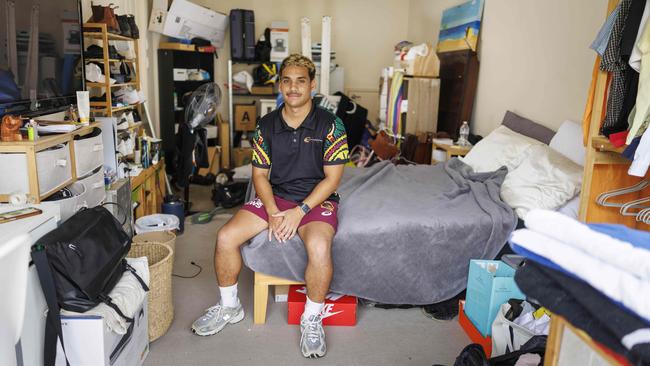
Phoenix Clayton, 23, studies a double degree in teaching and exercise science at the Australian Catholic University and rents his mum’s garage in Carina in Brisbane’s south.
To stay afloat financially, Mr Clayton works two jobs on top of full-time study. When his part-time retail job was only earning him $600 a week, he picked up casual out-of-school care work to cover his rising costs.
Now he brings home roughly $800 a week after tax, but his three major expenses – food, fuel and $150 in board – eat up about 60 per cent of his weekly earnings.
“Food is a big one,” Mr Clayton said. “I try to set myself a budget of around $150 for groceries but I end up always going over that.”
With only a slice of his budget left for other expenses, Mr Clayton often forgoes meals out and carefully considers or delays other purchases. “Especially before I got the second job … I didn’t often buy myself clothes or nicer foods,” he said. “An unexpected expense is shoes. Every time I need to buy new shoes for work or exercise it’s a blow to my budget – I try to avoid it.”
Mr Clayton wants to move back into a rental, but finding a suitable place is near impossible in his preferred area of Brisbane.
“I’m not happy being back at home because the house just isn’t big enough for all of us,” he said.
‘I try to set myself a budget of around $150 for groceries but I end up always going over that’
“It’s difficult looking for rentals that are within budget, and within the area we’re all my work and uni is. It’s either too far away or too expensive, sometimes both.”
Mr Clayton was looking for immediate cost-of-living relief out of the budget, with specific measures to reduce rent prices, grocery costs and HECS debt.
“A lot of my friends are in the same boat, most of them live with their parents, even the ones who work full time.”
– Elodie Jakes
Additional reporting: Timothy Little
Retiree revved up about budget impact on older Australians
Super changes and cost of living relief top the concerns of older Australians in this year’s federal budget.
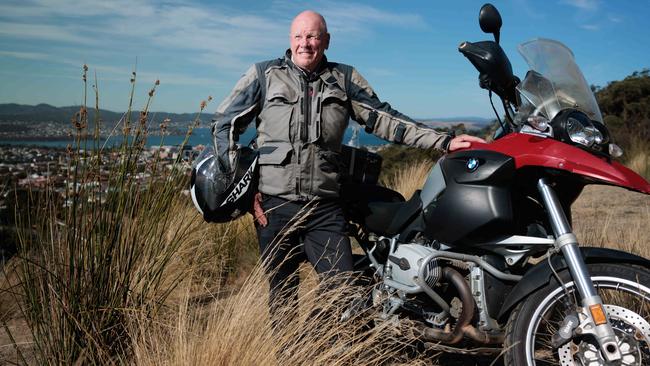
Retired senior public servant John Pauley still has plenty left in the tank. The 70-year-old is a keen cyclist and, while loath to call himself such, is also a motorcycle adventurer.
This autumn he plans a ride from his home in Hobart to the Devonport ferry, and then from Melbourne to Adelaide to see his beloved Crows in the AFL’s Gather Round.
That’s not to say he is carefree. Mr Pauley watches the federal budget with much interest.
He is one of the approximately one million Australians with an interest in a defined benefit scheme and will be paying attention to any moves that affect this payment.
“How the government handles cost of living is critical to me. What worries me most is all the costs I can’t avoid: insurance, rates, electricity and other utilities,” Mr Pauley said.
“I am pretty careful with my spending, including things like paying for things like rates, gas, electricity and water weekly so I don’t get any big bills.
“But this week I got my car rego, car insurance and home insurance in one go, and the overall cost has gone up by thousands in the last 12 months. The government’s $150 electricity subsidy for next year will be quickly chewed up by increased charges we face down here in Tasmania.”
Mr Pauley said he would closely monitor the budget’s impact on interest rates.
“I do need to worry about interest rates,” he said. “I still have a small mortgage, which I can service at present, but I need renovations to my house, and it won’t be easy to service an additional loan out of the income I receive from my defined benefit pension.”
Like many retirees, Mr Pauley has concerns about reforms to superannuation proposed by the Grattan Institute, including lowering the Division 296 tax threshold from $3m to $2m and encouraging retirees to use 80 per cent of super savings above $250,000 to purchase an annuity from the government.
– Stephen Lunn
Rent deal a lifesaver but steak off the menu
Emily Lowe and Ben Taylor know they have a sweet deal with their rental property on Brisbane’s southside, but it’s not enough to stop grocery and electricity costs mounting.
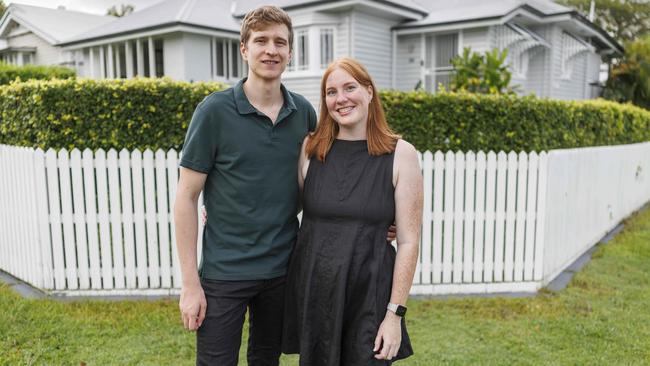
Emily Lowe and Ben Taylor, aged 25 and 27, moved in together a few months ago, renting a Queenslander in Holland Park West, within the Greens electorate of Griffith. They split the weekly $775 payment four ways with Ms Lowe’s parents, who regularly commute to Brisbane from their home in northern NSW.
“Rent is really low compared to many of our friends,” Ms Lowe said.
“We’re on a pretty good wicket. Otherwise, we’d probably be in a small unit.”
While every bit helps, the public affairs manager and superannuation consultant who earn $140,000 combined have not been immune to cost-of-living pressures. Nights out at bars with friends have become barbecues at home; steak and other “luxuries” are off the shopping list.
“When I go grocery shopping, I just have to be conscious of what I get. I only get things if they’re on special where, in years past, I’ve just got whatever I wanted. Having to give up those little luxuries is tough,” Mr Taylor said.
One of the luxuries Ms Lowe won’t give up is the airconditioning during Brisbane’s humid summer. Their last monthly power bill was $200, which the couple also split with Ms Lowe’s parents.
“We haven’t been using the aircon as much and I’ve noticed the bill going down, but it’s still pretty significant,” she said. “We have to add gas into our bills allowance, as well.”
The couple would love to buy a property together but homeownership feels increasingly out of reach, “unless an immediate relative were to pass on an exorbitant amount of money,” Ms Lowe said.
The couple had their respective university debts of $20,000 and $16,000 cut by 20 per cent last year under the Albanese government’s cost-of-relief measures. Last month, Treasurer Jim Chalmers urged banks to relax the way they assess this debt when calculating a first homebuyer’s capacity to borrow to help them into their first home.
“After going to university, we contribute pretty significantly to society and the economy in general,” Ms Lowe said. “So, to have your security in the future impacted by your ability to afford a loan because of your education, it’s a tough pill to swallow.”
– Mackenzie Scott
After care costs, little left for 10-year-old fun
Life is tough for a “single grandmother” caring for her grandson in a marginal Labor seat, while budget, election promises fall flat.
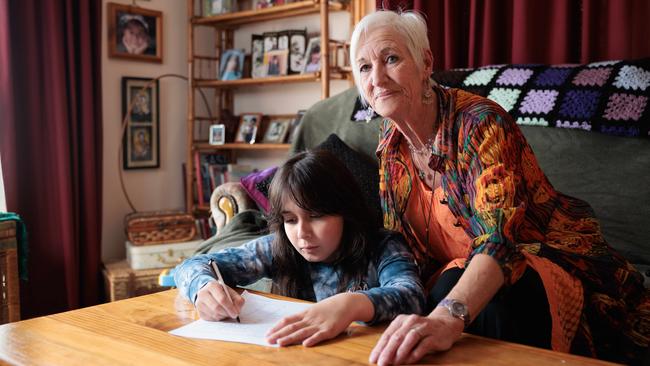
By the time Jennifer Booth pays her bills and rent and buys groceries, there is little left to treat or entertain her 10-year-old grandson, who lives under her care.
“Just being able to get in the car and take him for a drive is limited, with the finances I have,” says the 65-year-old marginal seat voter. “I don’t have any entertainment.”
Ms Booth relies on her disability pension, carer’s allowance and family tax benefit to support herself and grandson Levi, providing a total of $1355 a fortnight.
However, only about $200 a fortnight is left after meeting essential costs, making it impossible to provide the kind of life she would like for Levi. “After I pay the bills, we’re left with not a lot to do anything,” she said. “The cost of groceries is just stupid – that is where most of our money is going. I’m forever saying to Levi ‘no – sorry mate we can’t do that’ because we just can’t afford it.”
Levi has attention deficit hyperactivity disorder and Ms Booth said her daughter, Levi’s mother, was unable to care for him. While Ms Booth recently obtained some respite care, the cost of petrol for the drive there – about 45km – was a real issue.
‘The cost for groceries is just stupid – that is where most of our money is going’
Medical costs were also a battle. “Some of the medication I’m on is not covered by the PBS,” she said.
Winter energy bills also presented a struggle, making heating every room of her subsidised accommodation cost-prohibitive, despite agreeing to a regular direct debit.
“It’s hard because Levi spends a lot of time in his room and the (main source of) heat does not go into that room, so he has to have his own heater,” she said.
She would like to see the government do more to reduce the cost of home energy and groceries.
The government’s extension of the Energy Bill Relief Fund, providing a further $150 his year, “will help a lot” but she was concerned it would not be extended and could be easily swallowed up by other bill and cost-of-living increases.
Ms Booth said increasing benefits was not the best way of helping her, as this would increase her income for the purposes of determining her rent. “Every time I get a pay rise I give half of that back to housing,” she said. “We don’t get to keep it because our rent is assessed on income. I would be better off with gift vouchers so I could go to Woolies or Coles and buy petrol or food.”
– Matthew Denholm
Cafe culture: help us get our Mojo back
The cafe has become part of the fabric of Mundaring, but after a strong start, Ronald Colijn has seen conditions become increasingly difficult.
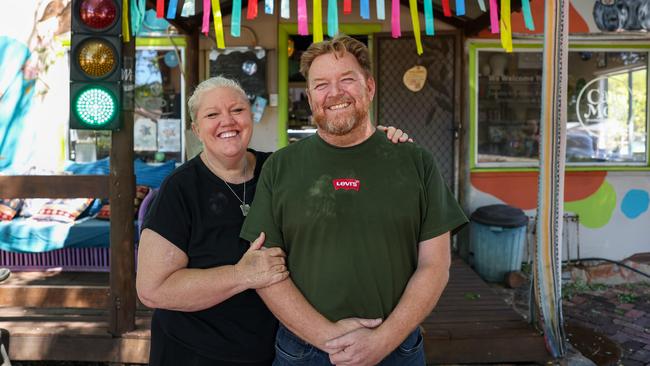
For Ronald Colijn, co-owner of Mojo Cafe in Mundaring, the Albanese government’s $150 energy-relief payment for small businesses will make no difference as he battles the twin challenges of rising costs and falling customer spending.
Mr Colijn, 58, and his chef wife Joanne Colijn-Dew, 56, opened Cafe Mojo on the outskirts of Perth seven years ago.
The cafe has become part of the fabric of Mundaring but, after a strong start, Mr Colijn has seen conditions become increasingly difficult. He has had to cut opening hours and has shrunk the roster of staff from 35 to 26 as he battles to handle rising wages, input costs and regulation at a time when cost-of-living pressures are crimping the spending capacity of his customers.
“As a business, we are struggling in that we still have the same amount of people, but they spend way less money than they used to, and on top of that, the product margins are getting very, very low,” he said.
Years of increases in the award wages for hospitality workers and surging costs for workers compensation and other insurance means have been particularly difficult to wear.
“I sometimes wonder where the government thinks we’re getting all these wage increases from, because, as a business it is just higher and higher and higher expenses. We can’t keep on going like that,” he said.
“Our staff work hard and they deserve their money, but in the end, the money needs to come from somewhere.
“It’s lovely of the government to say, ‘here you go, there’s another 5 per cent increase’ like they did last year, but it doesn’t come from the government, it comes from my pockets, and those pockets are already quite thin.”
Those awards, he said, had become “horrendously complicated” and more costly to navigate. He said he knew a lot of small business owners in hospitality who were now questioning their future.
To try to adjust to the tougher conditions, Cafe Mojo has started offering lower-priced, half-sized portions to cater for the reduced budgets. It has had to scale back its sponsorships of community organisations, and training that was planned for the cafe’s workers has been deferred.
He sees little value in one-off sugar hits such as the $150 electricity credit, and would rather see that money go towards more meaningful structural measures including training, education, or support for community organisations. He was eager to access the 50 per cent grant for small businesses to install rooftop solar panels, but could not take up the initiative as the grant would only arrive after completing tax at the end of the financial year.
– Paul Garvey





To join the conversation, please log in. Don't have an account? Register
Join the conversation, you are commenting as Logout